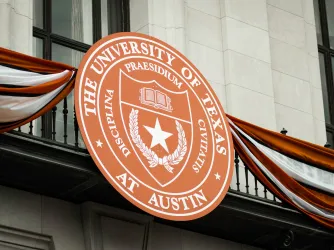Table of Contents
Right to Wear Greek Letters Vindicated at UT Arlington
Recently, FIRE intervened at the University of Texas at Arlington (UTA) after the Sigma Phi Epsilon (SigEp) fraternity brought to our attention what I suspect is an all-too-common punishment against fraternities and sororities: the prohibition on displaying their letters in any way while the chapter was under investigation. After FIRE brought this issue to UTA's attention, the university promised that students and student organizations at UTA enjoy the full freedoms of the First Amendment.
Here's the background on the chain of events resulting in this unconstitutional punishment for SigEp, as we wrote in a letter to UTA President James D. Spaniolo on September 13:
Following an off-campus party held February 4, 2012, which resulted in allegations of "hazing," UTA's Sigma Phi Epsilon ("SigEp") chapter was notified in a February 10 letter from SigEp national Chapter Services Director Josh Hodnichak that it was to "immediately cease any and all chapter activities." These activities included "new member activities, Inter-Fraternity Council events, intramural games, social events, chapter meetings, and all other chapter activities." SigEp complied with these orders. SigEp President Troy Maikowski received a similar letter, also dated February 10, from Heather L. Snow, then director of UTA's Office of Student Conduct, ordering the fraternity to "cease and desist all activity" while under investigation. Snow's letter, however, went so far as to ban "wearing of letters on campus." Snow's letter also made clear that the order covered "both on and off campus activities and include[d] formal and informal group gatherings," and warned that "[a]ny further activity that represents the Texas Chapter of Sigma Phi Epsilon either on or off campus during the suspension period may result in additional disciplinary action being taken."
[Link and emphases added.]
Whether or not SigEp was guilty of "hazing," to be clear, was not FIRE's concern, and we did not address it in our letter. (SigEp was later found not to be in violation of UTA's hazing policies, and according to Maikowski, the ban on all activity and wearing of the fraternity's letters was lifted.) It's the bolded sections above that raised our concerns, starting with the ban on "wearing of letters on campus." As we made clear to President Spaniolo, "There is simply no authority on which UTA ... can constitutionally prohibit all members of a fraternity, sorority, or any other student organization from broadcasting their affiliation in such a simple way, even if such groups are under investigation for conduct violations." FIRE agrees that UTA and other universities can (and in many ways are legally required to) exercise oversight over student organizations to make sure they abide by their policies. Here, though, UTA's sanctions veered into the nonsensical, and it shouldn't be hard to see why: there are few rights more basic than the right to express one's affiliation, whether as a member of a Greek organization, a political party, or anything else.
UTA policy makes clear that "Greek chapters are officially regarded as recognized student organizations," and that "[s]tudents, faculty and staff are free to express their views, individually or in organized groups, orally or in writing or by other symbols, on any topic in all parts of the campus[.]" Thus, fraternities are entitled to the same First Amendment rights of expression and assembly as any other student organization. The corollary to this is that if SigEp was punished in this way, there is reason to expect that the same punishment might be imposed on other student organizations in the future. For instance, if the College Republicans student group were to be investigated for some misconduct, would UTA try to ban T-shirts with an elephant symbol on them? If not, how is this different in principle from banning sets of three Greek letters?
There were other problems with the policy, as well. For one, a ban on all types of "activity" and "gatherings," whether formal or informal, on-campus or off-campus, could be read to encompass virtually anything, including speech and assembly clearly protected by the First Amendment. As we wrote in our letter to UTA:
The example of non-Greek recognized student organizations is illustrative. Would UTA place the same restrictions on all "gatherings" on members of its political or cultural organizations? Would it tell members of the University Democrats that they were not allowed to gather as students and discuss Democratic Party politics—even off campus—if the group was under investigation?
That's obviously a preposterous—and unconstitutional—scenario. But given SigEp's experience, it's a plausible one. What if SigEp wanted to gather to protest what it saw as unfair hazing charges? What would UTA have done then?
FIRE hoped that UTA would allay our First Amendment concerns as expressed in our September 13 letter. Vice President for Student Affairs Frank R. Lamas responded to FIRE on October 3, stating that
"[s]tudents on our campus are given the opportunity to express their views individually and in organized groups, orally and in writing or by other symbols on our campus." But while UTA clarified that "at this time there are no bans on members wearing letters," it did not otherwise address our concerns over the improper sanctions it had placed on SigEp. FIRE wrote back a second time, requesting that UTA address this concern. Again, UTA declined, stating that it considered the matter closed. UTA also stated, however, that "there are no violations of any first amendment rights to our Greek and/or student clubs/organizations" and that "[a]t UT Arlington our disciplinary process never interfered with students' constitutional rights of any kind."
Given the ease with which it could have admitted its error, this response is disappointing. Still, UTA used the opportunity to make a clear statement of support for its students' right to free expression. We'll take it, and we'll hold UTA to it. Of course, proclaiming a commitment to free speech is the easy part. We'll be watching UTA to make sure it follows through on its word.
Recent Articles
FIRE’s award-winning Newsdesk covers the free speech news you need to stay informed.

FAQ: Responding to common questions about the fight between Harvard and the Trump administration

George Mason University calls cops on student for article criticizing Trump

FIRE and ACLU of TX: University of Texas must drop unconstitutional drag ban
